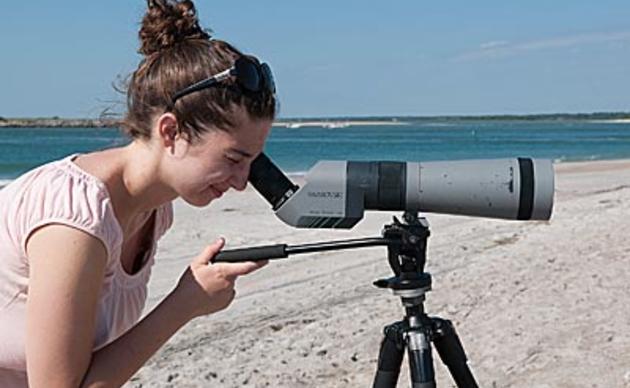Asheville Citizen-Times: Climate change isn't for the birds
The guest editorial by Heather Hahn originally appeared in the Asheville Citizen Times.
Can you imagine North Carolina without the iconic brown pelican or the adorable brown-headed nuthatch? An alarming report by National Audubon Society scientists reveals that hundreds of birds across the country are threatened by global warming, and many can be found right here in our state. Many of our most beloved birds could go extinct if we don’t take decisive action to protect their habitats and reduce the severity of global warming.
What do North Carolina’s birds mean to my family? Every family vacation at the beach was full of memories of pelicans diving for fish and shorebirds poking around in the sand to eat while I built sandcastles (as my brother knocked them down). On the way to dinner, a must-see stop was the osprey nesting behind the restaurant. Much of my childhood could be recreated from stories about birds. I don’t want to imagine a world where my daughters can’t experience the same joy.
But the alarming truth is that within my daughters’ lifetime, the world may have drastically fewer birds. Global warming threatens to take all of that away.
Audubon ornithologists spent seven years analyzing data, taken over decades on 588 bird species, and found that one in five birds will suffer severe declines by the time my youngest daughter is my age. What’s worse? By 2080, the time she is about my mother’s age, nearly half of our birds will be at risk of extinction — because of the effects of climate change.
We know that losing our birds is not the only consequence of global warming. Extreme weather, agricultural disruptions, sea level rise, and greater threats to our health — these are consequences we’re seeing already.
To me, this is personal. This is about the kind of world I want to live in and leave for my daughters. Like the canaries in the coalmines indicated an unhealthy environment for people, birds are again sounding the alarm. It’s imperative that we act now before it’s too late. The Audubon study gives us plenty of reason for hope. It’s a roadmap to a better future for our birds, our children, and us.
So, what can people do? We need to protect the places birds need today and the places they’ll need in the future. And we need to do everything we can to reduce the severity of global warming.
Audubon North Carolina is no stranger to protecting bird habitat. To date, our organization has successfully identified and worked to protect 4.9 million acres of private and public land that serve as crucial habitat for birds to survive and thrive here. These 96 important bird areas span the mountains to the coast, protecting vital habitat for hundreds of bird species and other wildlife.
Today, that work takes on even greater urgency. The places birds live today will be bridges to the future.
Audubon’s study identifies “stronghold” areas, which birds will need to survive in the future. This is a powerful new approach that will help us make smart conservation investments in places that will help birds weather the intensifying storm of climate change.
With our diverse landscape, North Carolina has been identified as one of these strongholds. How we work together to protect our birds today will have a wide-reaching impact on how they survive the effects of climate change in the future. The actions we take now will help reduce the severity of global warming, creating a brighter future for birds, our children, and us.
The pelicans and nuthatches, thrushes and warblers are defining features of our community and our lives here in North Carolina. We now know our birds are under siege. And we know that if birds are in trouble, we are too. Everyone who cares about birds and the well-being of our community has to take that seriously.
Heather Hahn is executive director, Audubon North Carolina.
How you can help, right now
Donate to Audubon
Help secure the future for birds at risk from climate change, habitat loss and other threats. Your support will power our science, education, advocacy and on-the-ground conservation efforts.
Sign Up For Our eNewsletter
Keep up-to-date on all that happens with Audubon North Carolina's research, events and volunteer opportunities.




